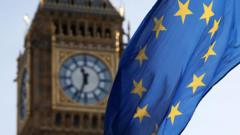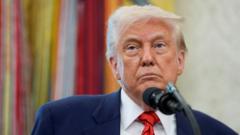With a focus on forging closer ties, the UK-EU summit highlights key issues of trade, defence, and cooperation against the backdrop of global challenges and shifting political dynamics.
UK-EU Summit Marks New Era Amid Complex Defence and Trade Negotiations

UK-EU Summit Marks New Era Amid Complex Defence and Trade Negotiations
The UK and EU prepare for a historic summit, grappling with trade barriers and defence cooperation in a post-Brexit landscape.
The UK and EU are poised to hold their first summit since Brexit on Monday in London, symbolizing a significant moment in bilateral relations. Officials and analysts emphasize that while past bitterness lingers, current global issues have necessitated collaboration between the two powers, particularly in response to geopolitical tensions stemming from Russia, China, and the evolving dynamics of U.S. foreign policy.
As France plays a hardball role in negotiations, the summit comes alongside an invitation for French President Emmanuel Macron for a state visit to the UK this summer, suggesting an effort to mend relations. According to analysts, the summit is expected to produce a joint declaration focusing on shared concerns over security, trade, and international cooperation.
Key announcements anticipated from the summit include a new security and defence pact, cooperation on a Ukraine ceasefire, and measures to ease trade barriers established post-Brexit. However, expectations remain tempered, with analysts cautioning that ambitions might be limited given the UK's adherence to its self-imposed red lines.
Efforts to improve trade relations may see the UK pushing for a sector-by-sector approach, especially regarding plant and animal health, while addressing fishing rights to satisfy various EU member states. The Labour government is under pressure to navigate public sentiment that prioritizes trade with the EU over the US.
Negotiations could also lead to discussions on a proposed Youth Experience Scheme to facilitate professional exchanges and reduce visa restrictions, as well as initiatives addressing illegal migration and energy trading.
While the potential for economic growth remains a focal point, political concerns hinder bold measures, particularly amid fears of resurgence from Eurosceptic factions. Defence cooperation discussions will also confront the complexities of integrating UK firms into EU contracts within a changing European landscape influenced by shifting alliances and the adequacy of shared security strategies.
The outcome of the summit will set the stage for future UK-EU engagements, while reflecting the challenges of aligning national interests in a rapidly evolving geopolitical landscape.
As France plays a hardball role in negotiations, the summit comes alongside an invitation for French President Emmanuel Macron for a state visit to the UK this summer, suggesting an effort to mend relations. According to analysts, the summit is expected to produce a joint declaration focusing on shared concerns over security, trade, and international cooperation.
Key announcements anticipated from the summit include a new security and defence pact, cooperation on a Ukraine ceasefire, and measures to ease trade barriers established post-Brexit. However, expectations remain tempered, with analysts cautioning that ambitions might be limited given the UK's adherence to its self-imposed red lines.
Efforts to improve trade relations may see the UK pushing for a sector-by-sector approach, especially regarding plant and animal health, while addressing fishing rights to satisfy various EU member states. The Labour government is under pressure to navigate public sentiment that prioritizes trade with the EU over the US.
Negotiations could also lead to discussions on a proposed Youth Experience Scheme to facilitate professional exchanges and reduce visa restrictions, as well as initiatives addressing illegal migration and energy trading.
While the potential for economic growth remains a focal point, political concerns hinder bold measures, particularly amid fears of resurgence from Eurosceptic factions. Defence cooperation discussions will also confront the complexities of integrating UK firms into EU contracts within a changing European landscape influenced by shifting alliances and the adequacy of shared security strategies.
The outcome of the summit will set the stage for future UK-EU engagements, while reflecting the challenges of aligning national interests in a rapidly evolving geopolitical landscape.



















